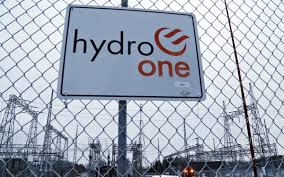
Last Thursday, June 18th, a public meeting to stop the sale of Hydro One took place at the Peterborough Lions Community Centre. Approximately 90 people assisted to the event.
The Liberal governments objective to privatize Hydro One had visibly created a frustration, which was apparent at this event, where audience members could be heard commenting, “shame, shame, shame” across the hall.
The plan to sell Hydro one is part of the recently introduced Omnibus Bill 91, which states the liberal’s plan to privatize Hydro One and local distribution companies (LDC’s).
One of the speakers was Paul Kahnert, a former organizer for the Ontario Electricity Coalition. He explained how the language of the sale has change in the recent years from privatization and monetization to the current “asset recycling”.
He criticized this concept as if Hydro One was some sort of ‘trash’ that needs to be recycled. In fact, Mr. Kahnert challenged the misleading idea that privatization of publicly owned companies always leads to efficiency gains and cost reductions as a result of ‘private discipline.’
This mantra of privatization is part of the global neoliberal trend. In many parts of the world, not only are public assets being privatized but also the most fundamental of rights: the right to drinkable and safe water.
The ‘one size fits all’ neoliberal approach continues to expand the already gigantic gap between the wealthiest and the poorest, not only in Canada, but also in the rest of the world. As Mr. Kahnert agreed, Canada has a wealth distribution problem not a wealth creation problem.
Matthew Davidson, a former OPIRG coordinator, also spoke at the public meeting. He highlighted how the liberal government is taking away our collective power and how Ontarians need to keep control of their energetic future.
Davidson argued that when “liberals say that there is no money for infrastructure, necessitating the sale of Hydro one, or when they say there is no money for education, necessitating higher education fees, is because they are okay with sacrificing the common good for corporate profit”.
Davidson also expressed that we need a democratic economy and challenged the economic austerity strategies. “Cuts are not necessary, but redistribution is, and that austerity is not the lack of money, but the lack of democracy.”
In concordance with neoliberal privatization around the world, selling off Hydro One corresponds to the logic of privatizing public assets and cutting programs and public spending, which ignores any sort of contextual, historical or local factors.
In fact, the plan to sell Hydro One is based on the premise that private ownership will reduce costs and hydro bills. Jennifer French, the MPP for Oshawa, explained that selling something that is revenue generating is not forward thinking.
She especially highlighted how the liberal government is using the terms ‘broadening ownership’ and optimizing assets, and challenged it by arguing that it cannot get broader that every single person in Ontario.
Ms. French urged all Ontarians to take action and visit their MPP and city councillors to express that selling off Hydro One is not in the best interest of Ontarians and the generations to come.
Hydro One has a long history of public ownership and has been at the forefront of allowing Ontarians to have affordable and accessible electricity. In fact, Fred Hahn, CUPE Ontario’s President, argued that private ownership will increase prices, as it happened in Nova Scotia.
He furthermore explained how the Liberal government is arguing that the sale is necessary because we need to build infrastructure, and we do need infrastructure, roads, hospitals, and schools.
However, he stated, “liberals are selling schools, cutting hospital beds, they are not interested in building infrastructure.”
Mr. Hahn also contended that it makes no economic sense. CUPE’s handout provided information about the numbers behind the deal. Economists David Peters and Douglas Peters estimate that selling 15 percent of Hydro one will result in in a net loss of 84.7 million dollars a year while selling 60 percent would result in a net annual loss of 338.8million dollars. He also argued that it makes no political sense and that the liberal government will face harsh political consequences if they succeed in selling off Hydro One.
A question period followed the speakers’ remarks. One of them concerned the influence that NAFTA would have if the privatization of Hydro One carries on.
In fact, NAFTA’s chapter 11, which is the investment chapter, outlines the rules, rights and protections that investors have. Basically, this chapter allows a company to initiate a binding legal dispute for monetary damages if the company believes that a NAFTA government has violated their rights.
These legal disputes happen in special tribunals, which do not guarantee the openness that national courts have. Special bodies that are closed to public participation and observation litigate these so called “investor-to-state cases.”
In light of this, the concern becomes one of accountability. The possible privatization of Hydro One will not only increase the hydro bill and give away the control of Ontarian energetic future, but it will also make Ontarians susceptible to investor’s legal disputes that will cost even more tax dollars.
The fight is just starting; communities across Ontario have expressed their dissatisfaction with the proposed plan to sell Hydro One. In fact, a poll commissioned by Mr. Hahn and conducted by Environics Research, shows that 88 percent of residents oppose the Liberal government’s plan to privatize Hydro One. Eight in ten residents also believe privatization will result in higher rates on their electricity bills.
Community members that want to get involved can send a letter to their MPP through KeepHydroPublic.ca, and also ask a local municipal councillor to put forward a motion to stop the sale and get involved with CUPE’s events.

